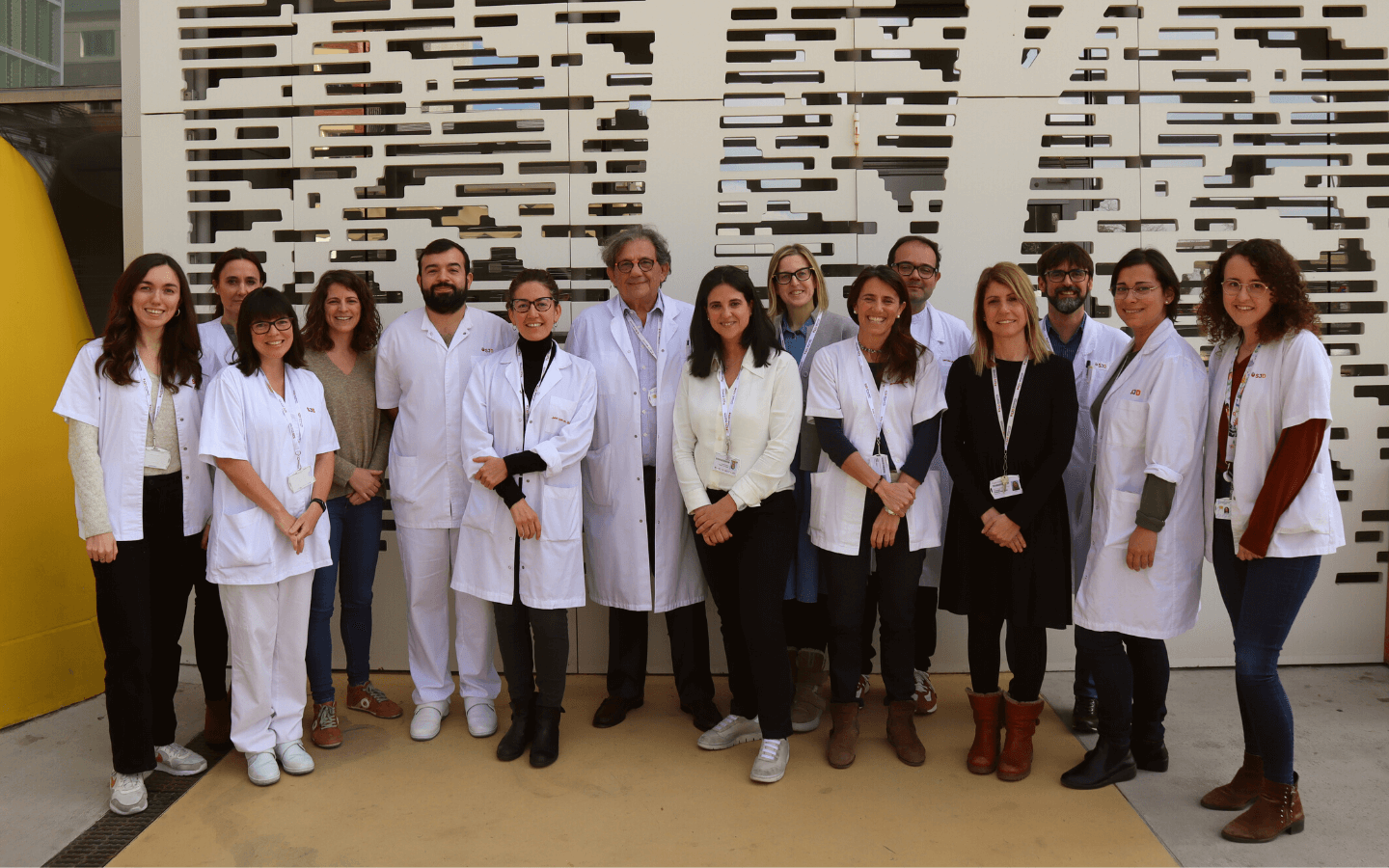Epilepsy and movement disorders in Pediatrics
Research Program
Leaders
Where we are
 SJD Barcelona Children's Hospital
SJD Barcelona Children's Hospital
Related websites
The Complex Epilepsies Research Group (CEReG) is dedicated to generating knowledge in the diagnosis and treatment of diseases that present with complex epilepsy or movement disorders. We focus on clinical and translational research, and use innovative technologies such as advanced neuroimaging, HD-EEG, HFOs, cerebral mapping, and genomics to develop diagnostic biomarkers in epileptic encephalopathies and developmental disorders, structural focal epilepsies that are drug-refractory, and movement disorders.
In addition, we collaborate on international projects for the development of personalized therapies in this group of pathologies. We have accreditations as a reference center for complex epilepsies in Catalonia (XUEC), CSUR in refractory epilepsies (CSUR-39), and in diseases that present with movement disorders (CSUR-53), and we are part of several European reference networks (ERNs) such as EpiCARE-Rare and Complex Epilepsies, coordinated by Alexis Arzimanoglou, and ERN-RND (Rare Neurological Disorders). We are also members of CIBERER and recognized by AGAUR as a consolidated research group in Neuroscience.
Research lines
- Diseases with Movement Disorder (PI: D. Ortigoza).
- Neonatal seizures and epileptic and developmental encephalopathies of early onset of genetic and neurometabolic origin (PI: C. Fons).
- Structural focal epilepsies (PI: J. Aparicio).
- Epilepsy and sleep, comorbidity of sleep disorders (PI: O. Sans).
Scientific objectives
- Phenotypic and genotypic characterisation of diseases with movement disorders and study of diagnostic biomarkers.
- Study of prognostic and diagnostic biomarkers and design of personalised therapies in neonatal seizures and epileptic encephalopathies of genetic and neurometabolic origin.
- Study and development of pre-surgical diagnostic evaluations and analysis of diagnostic, therapeutic and prognostic biomarkers in structural focal epilepsies.
- Study of cardiorespiratory changes during sleep in children with epilepsy and their relationship with epileptic seizures.
Area/Field of expertise
The field of epilepsy research encompasses a variety of specializations, including:
- Analysis of the brain bioelectrical signal, both at the level of surface electrodes (scalp) and deep electrodes (surgically implanted at intracerebral level). The characteristics of pathological electrical rhythms and their relationship with the ictal onset zone and the post-surgical outcome of epilepsy will be determined in an automated way.
- Evaluation of neuroimaging (structural and functional) in the pre-surgical study of epilepsy. Qualitative and quantitative assessment of the alterations observed in the different neuroimaging tests (structural and functional brain MRI, ictal and interictal SPECT, brain PET), and correlation with ictal symptomatology, electroencephalographic and neuropsychological findings, and post-surgical outcomes.
- Aetiological assessment of epilepsy, especially at the genetic and metabolic level. These disorders will be analysed, including an electro-clinical-radiological description, using structured video-electroencephalography, neuropsychology and neuroimaging protocols.

Group members
-

Jefe de Grupo
-

Maria Del Carmen Fons Estupiña
Investigador
-

Investigador
-

Investigador
-

Ayudante de investigación
-

Ayudante de investigación
-

Ayudante de investigación
-

Santiago Antonio Candela Cantó
Ayudante de investigación
-

Investigador
-

Ayudante de investigación
-

Investigador
-

Ayudante de investigación
-

Investigador post-doc
-

Ayudante de investigación
-

Paula Juliana Rodríguez Soler
-

Ayudante de investigación
Last Publications
- Granja-Dominguez A, Martin-Gomez C, Ortigoza-Escobar JD, Rodriguez-Lopez R, Gonzalez-Bermudez L, Dantone S, Pavanello S and Blasco-Amaro JA A proposal to involve people living with rare and complex conditions in the development of clinical practice guidelines. PATIENT EDUCATION AND COUNSELING . 135: 108708-108708.
- Moya-Mendez ME, Bidzimou MT, Muralidharan P, Zhang Z, Ezekian JE, Perelli RM, Parker LE, Prange L, Boggs A, Kim JJ, Howard TS, Word TA, Wehrens XHT, Reyes Valenzuela G, Caraballo R, Garone G, Vigevano F, Weckhuysen S, Millevert C, Troncoso M, Matamala M, Balestrini S, Sisodiya SM, Poole J, Zucca C, Panagiotakaki E, Papadopoulou MT, Tchaicha S, Zawadzka M, Mazurkiewicz-Beldzinska M, Fons-Estupina C, Anticona-Huaynate J, De Grandis E, Cordani R, Pisciotta L, Groppa S, Paryjas S, Ragona F, Mangia E, Granata T, Megvinov A, Pavlicek M, Ess K, Simmons CQ, George AL Jr, Vavassori R, Mikati MA and Landstrom AP ATP1A3 Variants, Variably Penetrant Short QT Intervals, and Lethal Ventricular Arrhythmias JAMA PEDIATRICS . : .
- Lersch, R, Hartlieb, T, Pieper, T, Kudernatsch, M, Hofer, W, Barba, C, Guerrini, R, Giordano, F, Pommella, M, Schubert-Bast, S, Syrbe, S, Rego, R, Pinheiro, J, Feucht, M, Beck, A, Coras, R, Blumcke, I, Alber, M, Tacke, M, Rémi, J, Vollmar, C, Kunz, M, Shetty, J, Mclellan, A, Sokol, D, Kandasamy, J, Klotz, KA, San Antonio-Arce, V, Schulze-Bonhage, A, Pepper, J, Lo, WB, Arzimanoglou A, Francione, S, Braun, CJ and Borggraefe, I Seizure outcomes following epilepsy surgery in pediatric and young adult patients with high-grade brain tumors: Results from a European survey Epilepsia . : .
Projects
- Project name:
- RealiseD_Comprehensive methodological and operationalapproach to clinical trials in rare and ultra-rare diseases
- Leader
- Maria del Carmen Fons Estupiña
- Funding entities:
- European Commission
- Code
- 101165912
- Starting - finishing date:
- 2025 - 2029
- Project name:
- Validación clínica en entorno operacional del software BFiEEG de asistencia al diagnóstico prequirúrgico de la epilepsia farmacorresistente pediátrica
- Leader
- Javier Aparicio Calvo, Santiago Antonio Candela Cantó
- Funding entities:
- Ministerio De Ciencia E Innovacion
- Code
- CPP2024-011855
- Starting - finishing date:
- 2025 - 2028
- Project name:
- MAPAS DE CONECTIVIDAD FUNCIONAL CEREBRAL Y NEURODESARROLLO EN EPILEPSIAS PEDIATRICAS DE DEBUT PRECOZ (Proyecto EpiNeuroMaps)
- Leader
- Maria del Carmen Fons Estupiña
- Funding entities:
- Fundació Privada per a la Recerca i la Docència Sant Joan de Déu - FSJD
- Code
- PFNR0220
- Starting - finishing date:
- 2025 - 2026

 SJD Barcelona Children's Hospital
SJD Barcelona Children's Hospital